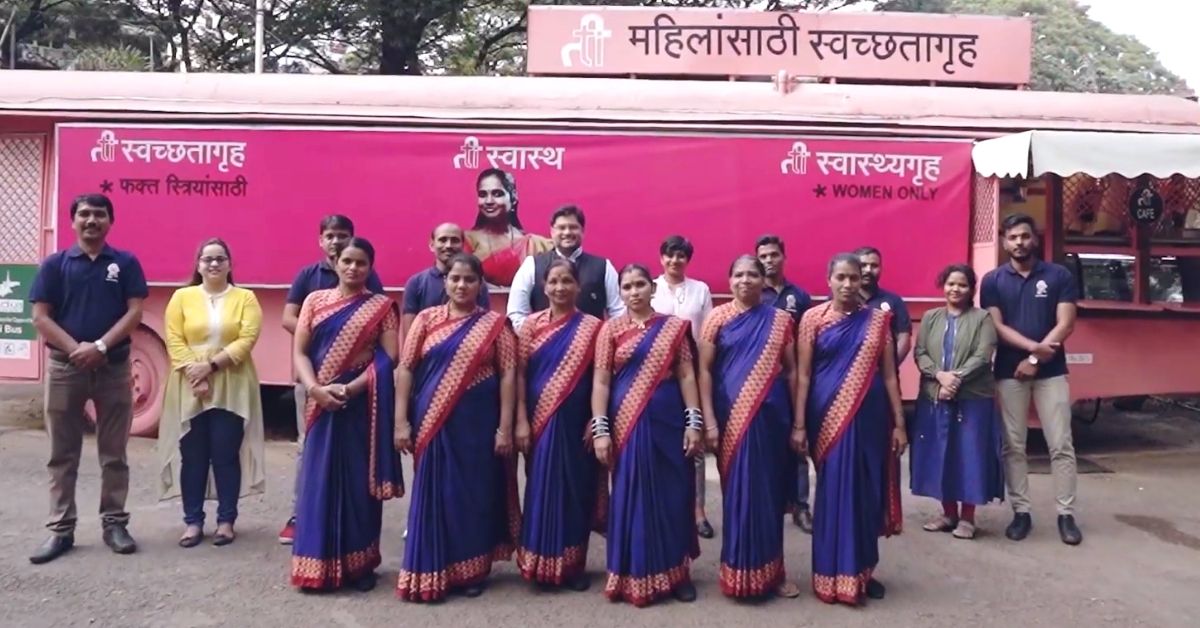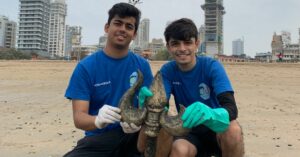Pune Duo Convert Old Buses Into Ladies’ Toilets That Have Been Used Over 1 Lakh Times
"Every person, regardless of their income level, should be able to access sanitation. Our dream is to launch 1,000 buses in the future," says co-founder Ulka.

How often have you had to hold in your pee in the absence of clean toilets? I have completely lost track of the times I have been in such a situation.
Sonam Nandawar, a resident of Baner in Pune, faced a similar predicament when returning home from work.
“As women, we face a lot of trouble when it comes to looking for a clean and hygienic toilet. Either the flush doesn’t work, or water isn’t available, making public toilets completely unusable,” says the 30-year-old administrator in a construction company.
She was looking for a clean toilet when she chanced upon a bright pink bus in Pune’s Aundh area. “I was surprised to see this pink bus and found that it was, in fact, a toilet that could be used by women. There were so many amazing features, and it was squeaky clean,” says Sonam.
The pink toilet buses that Sonam speaks about are the innovation of entrepreneurs Ulka Sadalkar and Rajeev Kher from Pune. The duo co-founded Saraplast Pvt Ltd, a company that has been working in the sanitation sector since 2006.
The first toilet bus was launched in October 2016 in the Shivajinagar area, in collaboration with the Pune Municipal Corporation (PMC). Now, there are 12 such buses in the city. These toilets are known as ‘Ti’ toilets, which in Marathi translates to ‘she’ or ‘her’.
Since beginning operations, the toilets have been used over one lakh times. “On good days, these toilets are used over 300 times in a day across all locations,” informs 43-year-old co-founder Ulka.
Unique features of the toilet buses

The features in the toilet buses show attention to women’s needs. There are wash basins with soaps and sanitary napkins for sale. For mothers, there is a diaper changing as well as a feeding station. There’s also a panic button in case of emergencies.
To ensure that there is no foul smell in the bus, a humidity and moisture chip, developed by MIT labs in the US, has been installed on the bus.
“Each of these buses has up to three to four western and Indian toilet units, depending on the size of the bus. There is also a temperature controller within the bus premises, lights, television and an attendant to manage the bus,” says Ulka.
The attendants also run a cafe within the bus where they sell packaged food items like biscuits and water. Some buses have sectioned off a place for local entrepreneurs to run their food cafes.

“When we were first brainstorming, we knew that there was a need for a sustainable revenue model for these toilets. We came up with about eight revenue models where we thought an area in the bus could be sectioned off to run a health centre, laundromat, training or an education centre, among others. Out of these, the cafe model came up in the discussions, and we thought it would be most viable,” explains Ulka.
The makers of the toilet buses have also kept sustainability in mind while designing them. Solar panels are installed over the roof of the bus, which powers all the gadgets, lights, and WiFi.
“Only during the four months of monsoon when there isn’t enough sunlight, we depend on the grid electricity which is supplied by the city’s electricity board,” points out Ulka.
Although the buses can be moved about the city, Ulka says that they will presently remain stationed at a particular place. “This would help women take notice of them and locate them easily when they need to,” says Ulka.
At Rs 13-15 lakh per bus, the duo has stationed these toilets across 12 areas in the city that include Shivajinagar, Baner, Vishrantwadi, Aundh, Anandnagar, and Phulenagar.
In most of these areas, the use of these toilets is free. While, in areas where the cost of running these toilets is high, they charge Rs 5 per use, mentions Ulka. This goes towards the monthly managing cost of approximately Rs 45,000 and salaries for the attendants who make between Rs 15,000-20,000 per month.
The founders and their work in sanitation

Ulka completed her degree in Production Engineering from Bharti Vidyapeeth College of Engineering in Pune in 1998. After that, she went on to work in the steel industry, finally joining and co-founding Saraplast in 2006.
Rajeev, 45, on the other hand, pursued his MBA from Symbiosis in Pune. After this, he was almost on his way to pursuing a career in the corporate sector when he gave it all up to bring in a change in the sanitation sector.
This led to the founding of Shramik Sanitation Systems in 1998, where the company was renting out portable toilets and continues to do so. “We mostly work with different stakeholders when it comes to providing toilets. We have provided them for events like concerts and pilgrimages,” Ulka explains.
In April 2016, Ulka read about an NGO in San Francisco which had converted old buses into toilets.
“This is the first time we realised this model could be easily replicated in India with old discarded buses. Around this time, the government wanted to innovate the sanitation sector and had launched the ‘Swachh Bharat Mission’. This gave us a push, and we worked towards converting old, abandoned buses into public toilets,” says Ulka.
With her expertise in Production Engineering and Rajeev’s business acumen, they came up with the first toilet bus within five months.
Sailing through hurdles and plans for the future

The long years of contribution in the sanitation field have not been free of challenges.
“When we first launched, many women thought it was too fancy or expensive to use these toilets. While others thought the complete opposite and assumed that since these were public toilets, they would be dirty,” she explains.
However, once the toilet buses were in operation, all these concerns faded away.
“Finding attendants to work in the toilets was another challenge. Women did not want to work in the sanitation sphere as there was too much stigma. But, once they started working here and managing the cafes, they felt empowered and overcame their mental block,” she says.
Ulka mentions that attendants sometimes even bring their daughters to work.
So, what’s in store for the duo?
They are currently waiting to launch toilet buses in Mumbai, Bengaluru, Hyderabad and Nagpur by the end of this year, in collaboration with government bodies and through CSR projects .
You May Also Like: Here’s How This NGO Helped Build 10 Lakh Toilets, Produce 543.5 Tonnes of Compost
“We truly believe that clean, public toilets should not be a distant dream. Every person, regardless of their income, should be able to access sanitation. Our dream is to launch 1,000 buses in the next five years,” she says, signing off.
(Edited by Shruti Singhal)
Like this story? Or have something to share?
Write to us: [email protected]
Connect with us on Facebook and Twitter.
This story made me
- 97
- 121
- 89
- 167
Tell Us More
We bring stories straight from the heart of India, to inspire millions and create a wave of impact. Our positive movement is growing bigger everyday, and we would love for you to join it.
Please contribute whatever you can, every little penny helps our team in bringing you more stories that support dreams and spread hope.



















